Graham Reid | | 11 min read
Bob Brozman: Beer Belly Dancing (from Six Days in Down)
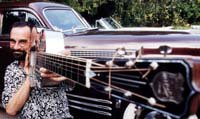
American guitarist Bob Brozman must
have an impressive passport. For the past two decades he has been
almost itinerant as he has played across the planet from Hawaii to
Mali, Okinawa to Papua New Guinea. And along the way he has
collaborated with some exceptional musicians, among them Indian slide
guitarist Debashish Battacharya for the album Mahima, Okinawa
guitarist Takashi Hirayasu (on Jin Jin and Nankura Naisa) and
musicians from the Reunion Islands.
Born in New York in 1954 and having studied ethnomusicology at Washington University, he has won numerous awards, wrote the definitive history of his favourite instrument (The History and Artistry of National Resonator Guitars) and his website offers tips for guitarists.
He has most recently recorded with Irish musicians (Six Days in Down) of which he says, “After a lifetime of collaborating with musicians from tropical islands, I thought a cold-climate island project would be interesting and challenging”.
Bob Brozman -- who died at his California home in April 2013 at age 59 -- appeared at the 2003 Taranaki Womad Festival with guitarist Takashi Hirayasu, and in 2011 returns, this time just himself . . . .and half a dozen guitars.
Hello Bob and I find you at home in
Northern California. I'm rather surprised, have you run out of places
to go to?
(Laughs) I just wrapped up a three month long tour so I'm taking time to put some things in place at home.
I've been enjoying Six Days in Down and
especially the piece Beer Belly Dancing which and almost seems the
archetypal Bob Brozman piece, you think it is one thing and it is
something completely different. I'm interested to know how is it that
you can fit in with people in very different cultures. I know you
have academic training but is it more something intuitive that you
have which many others possibly don't?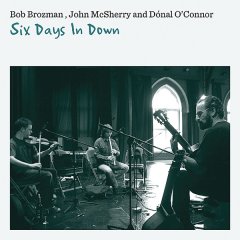
If I had to boil it down to a simple
phrase it is the never-ending task of learning how to pay attention
to something. You never stop getting better at that and before
meeting these guys I'd never played a note of Irish music in my life.
Of course there are many Americans and Australian musicians who play
Irish music very well, so I realised I had to take a completely
unconventional approach and not be melody-based when playing with two
of the best melody guys around (uillean piper John McSherry and
fiddle player Donal O'Connor)
So my task was to create interesting backgrounds on the one hand for the more Irish stuff and then challenge them. Beer Belly Dancing was like, 'what are these notes you never really use?' and 'you phrase it as you wish'. And we composed that on the spot.
It's kinda one of my experiments I've done across a couple of my collaborations, that particular Arabic scale. I did that also with (kora player) Djeli Moussa Diawara on the track Voyage dans le Desert (on the album Ocean Blues) and that was the same ting, he'd never played in that tuning. But he applied his brilliant musicianship to it for about 30 seconds and I said 'let's roll'. And that's exactly how Beer Belly Dancing occurred as well.
I like that idea of focussing on the moment which is a very Zen thing: if you are cleaning windows you are cleaning windows. And I guess that allows you to hear clearly what the other person is doing, because you are going to be able to do your bit anyway.
You're right and you could put it more
simply than that, it is really about trying to make the other person
happy. And collaborating with the guys from Reunion Island, Rene
Lacaille and his company, because those guys are not forthcoming
teachers in their culture and they are doing this complicated rhythm
and if you're doing it wrong they kind of frown at you. So you have
to be mature enough to know it's nothing personal, it is more like,
'hey man, this music is already confusing enough and you're not on
the right place so stop, regroup, and figure out where you are and
then come back in'.
You would have learned to read body language very well over the decades?
That has been a part of my work,
absolutely. Just trying to be intuitive like that. At the same time I
can think about these things scientifically and discuss them that way
too. . . but in the moment, language is too clunky and clumsy to
define the fine grains of what is actually going on in the music at
that moment.
When you are in Papua New Guinea for example, could you speak pidgin with them, or is music the only common language you have with some people?
I tried to learn quickly so I could
understand what was going on with pidgin pretty much straight away.
Because they speak an English-based version of course.
Right, although I'm a little timid with
it now. But the guys from Reunion speak a French equivalent which is
creole, so that is not French but another language again. Just as
pidgin is another language from English. So I really had to learn
that and absorb and think quickly.
But with the PNG guys a lot of the
communication was musical and one or two could understand English as
well.
I imagine too as you have broadened your musical palette through ethnomusicological study or whatever, that you see more and more the connections between certain kinds of music, like that thread which runs from Celtic music through into Spain and almost into the Middle East. You can draw on that well.
One fascinating thing is that many
ideas travel better latitudinally than they do longitudinally in
world history. The most simple would be that the dawn of agriculture
seeds can travel from Ireland all the way to Japan and flourish at a
particular latitude, whereas in the western hemisphere corn had to be
[adapted] twice because it couldn't pass from village to village
through the tropics.
So back to the music, from Ireland all the way to Okinawa you quite often have three-stringed instruments tuned to either the tonic, 5th and octave or 5th, tonic and 5th, the famous notes from 2001 the movie.
So you find Greek and Khazak instruments, and Indian, Mongolian, Japanese and Okinawan instruments all tuned this way. The travel of music is interesting in that is similar to the travel of DNA and language. But musicians tend to be more open-minded than the average person, so in places like Greece and Turkey where the people are not too fond of each other the musicians play together.
So the transmission of music has always fascinated me, and the guitar in particular is this portable thing that went along with colonialism and a lot of the music I have been interested in my life happened in places where guitars turned up without instructions.
And you are talking there about India for example.
Well, we could start with Mississippi
(laughs), then Hawaii, Cuba, South America, PNG, India . . . and
often the European guitar arrived in its arbitrary European tuning
which forces one to accept a lot of memorisation, and 'you have to do
it this way because this is they way it is done'. All around the
world from Mississippi to Hawaii and PNG it is no coincidence that
musicians who encountered guitars without instructions, the first
thing they did was fail to understand that tuning and start retuning
until it sounded good.
So the open tunings in Delta blues are exactly the same as you get in Africa or Hawaii.
The question in the case of Delta blues and Western Africa is, which came first?
Well guitars came along a little later
on. The availability of inexpensive guitars didn't happen until the
very late 19th century so you don't really start seeing
guitar music in Africa until the 1920s and not in Mississippi until
1900. Prior to that the guitar was a courtly instrument. In America
it was like a parlor instrument, like a piano, and more for
middle-class and educated people . . . and the slaves were playing
banjos and fiddles. Then in the 1890s Sears and Roebuck started
selling inexpensive guitars by mail order so there was an explosion
of guitar activity.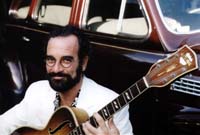
How do you account for what has been called desert blues or sub-Saharan blues, bands like Tinariwen and Etran Finatawa. Because the first time I heard them I thought it sounded like Chicago blues from the Fifties and Sixties, and yet it has clearly come from their own place.
I've long felt the black African and
Arab border is really where the blues found its tonality, the phrases
starting high and jaggedly working their way down is typical of blues
and that stems from that area and whether or not these current guys
in Africa have heard American blues corrupts the experiment a little
bit. I think some ethnomusicologists have concluded there were seven
waves back and forth between Cuba and West Africa in terms of musical
influence in the last 10 years.
That would account for certain sounds from Zaire turning up in Havana and vice-versa.
Exactly, with Etran Finatawa – and I
really love their sound by the way -- I hear it as African music and
I don't really hear it as them having listened to the blues and
re-Africanised it. That's just my opinion, I may be wrong.
That was always my impression. It was
highly unlikely those guys would have heard Chicago blues. They would
have come up with entirely independent but that there was something
in the tuning that made them move into that area.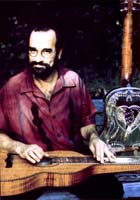
It is only the very clever Europeans
who invented the piano who came up with this idea of 12 notes to the
octave, the black keys on the piano. The natural state of humanity as
far as music is concerned is modal, which means you choose seven
notes and that is your octave, so major is a mode, minor is a mode,
those bluesy modes, indian modes . . . Alexander the Great conquered
a lot of territory and they brought the Greek modes with them.
So the Malian and Tuareg guys are playing in those kinds of modes which sounded natural to the ears of the black people in America who were picking up guitars. And within each of those phenomena, the closer you are to a city the closer you are to pianos and musical education.
So for American blues, the further you are out in the country the more likely you are as a guitarist to be playing in an open tuning and a modal fashion. The closer to the city you are hearing ragtime and stuff more sophisticated.
It's the same in Brazil. Anywhere near the city it is all samba and very sophisticated with Western harmony and you have to be knowledgeable about theory to be able to play. But out in the country, like I was south of Sao Paolo, the cowboys out there tune to open tunings like the Hawaiians and the Mississippians and they play basically a slack key guitar with a Brazilian rhythm.
Bob, did you discover this by going out there, or did some of your ethnomusicology studies help in this regard?
I have to be honest with you, I was a
young university student when I studied ethnomusicology and I feel
like I've been living it ever since. Pretty much everything I'm
talking to you about I figured out by being out there.
I was talking to Ry Cooder – who I found an astonishingly difficult man to get talking I have to say – so I thought I had to provoke him to get a response. So I said he'd often been described as an ethnomusicologist – well, of course he bristled at that and away he went saying those were university people but 'I am out there doing it'. And you are too, especially with Hawaiian music which has attracted you particularly.
It was my first exposure to a type of
world music and I got lead there by accident because I was interested
in the Resonator guitar, and after I came to know the inventor and
wrote the book I found these guys had no idea that blues even
existed. The guitars were made for Hawaiian music, so I started
chasing down 78s and discovering quite a depth in that music –
which was also to be found in Delta blues.
If you called me an ethnomusicologist I don't explode with anger. There is a school of thought here in America that if you think about something you can't feel it. But I don't agree with that. If you have 10 books in your library and you put 10 more in you haven't lost the first 10.
Ry Cooder's name comes up periodically with me but I have done things in a very different way because I have had the good fortune o not be a famous musician. When I approach my situations of collaboration my approach and reception is much less formal. So there is never the question that someone is the employer and some else is the employee, that just doesn't exist in my collaborations. I am happy to be corrected by a local musician if I'm doing it wrong.
You move on quite quickly into many
different collaborations and projects, one I found emotionally very
rewarding was the one with Debashish. Is that something you would
readdress?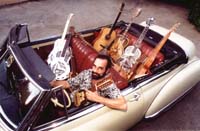
We crossed paths last summer in Canada
and played together at a festival but he's quite busy now and has
gone on to do some really great things since that collaboration. And
I've been busy too so finding the means is not easy, but sometimes we
get lucky and get booked at the same festival. Most all of the people
I've collaborated with, we've had opportunities to do things
together. With Takashi and Rene Lacaille and Debashish we've had
collaborations in Canada . . . so my friends can meet my friends.
That is a nice way of putting it. This time you are coming to New Zealand just by yourself?
And with half a dozen instruments. When I was there in 2003 I was pretty much doing my Takashi thing and this time I will be doing more like what I normally do: some calypso, some Hawaiian, some blues, some African . . . and I will have my 22-string Indian guitar which I didn't have the last time. It is one Debashish had made and it's a helluva thing to travel with, a nightmare getting it on and off airplanes.
Want more along similar lines? Try here and here.

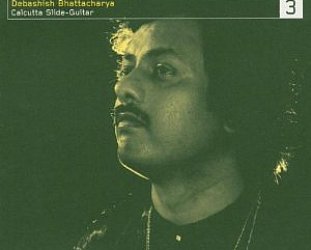
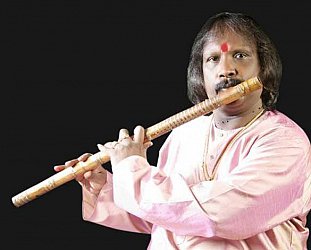

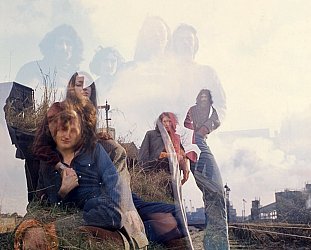


post a comment